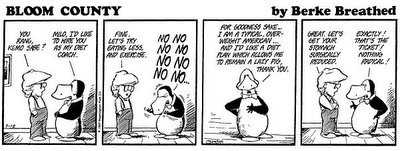I have a number of friends and family members who adhere to the Atkins diet. They're convinced that it's a great way to lose weight and stay slim. I have a number of reservations about the approach, but I'm not usually comfortable discussing it with them directly. So I figure, I'll write about it here, and maybe by chance one of them will happen to come across it...
When it comes to losing weight, I always remember the advice from this classic 1987 Bloom County cartoon:
I might add "eat right" to "eat less", but the basic message is incredibly solid.
My weight now is far from ideal, but I have successfully lost weight in the past, and from what I've seen the most important factor (I suppose besides genetics) is will power. (However, as Toad points out here [ignore the footnotes], sometimes a cake is preferrable to will power.) When I have committed myself to eating less and exercise, I've lost weight. When I don't do that - I gain weight. Pretty simple.
Fad diets have been around for a long time, but for some reason Atkins has come across as very attractive.
For the red-blooded American male (or immigrant to Israel) what’s more attractive than a diet that says eat as much meat as you can, and labels carbs as devil’s food (and devil’s food cake as carbs...)?
What’s my problem with it? Well I need to return once again to the 1980s - pre-Atkins. I got a copy of the book Jane Brody’s Good Food Book - Living the High Carbohydrate Way. She paints a picture of how a high carbohydrate diet is the most healthy way to live and will keep weight down as well. It fits well with everything I learned about nutrition and physiology in school.
The misconception that many people have that carbohydrates are fattening stems from the fact that we often put fattening things on top of our starches. But starches, particularly those that are full of fiber, are very healthy, and create a sense of satisfaction that reduces our appetites.
Brody brings many scientific studies that show the advantage of a diet high in fiber and carbohydrates and moderate in proteins and fats. But what convinced me most was her explanation of how man is designed. She entitled the chapter “Dietary Lessons from Human Evolution”. I won’t go into a discussion of evolution, but suffice it to say that if I can conclude that there are lessons from the way God created us, then they are much stronger!
She writes that “our teeth are structured more for grinding, like those of herbivorous cattle, than for tearing meat, like the teeth of carnivorous cats and dogs.” Also, “our long and convoluted intestinal tracts are better designed for the slow digestion of fibrous plant foods, rather than the short, straight, fast tract needed by carnivores to process meat”.
She describes how ancient man had relatively infrequent access to meat, while most of the time would eat starches, fruits and vegetables. When a meat meal would become available, he would eat as much as he could. We still have that passion today, but we end up eating much more meat than necessary. This is also the view of the rabbis, who wrote that “one should not eat meat unless he has an appetite for it (Hullin 84a).”
So instead of working with what the body is supposed to do, a high-meat, low-carb diet basically induces ketosis. That might not seem so bad, but I worked in a refet for a year and a half, and I saw what happened when the cows got bovine ketosis. Not pretty. It doesn’t seem appropriate for a person to bring it upon himself.
Additionally, it would seem that an Atkins type diet isn’t great for the kidneys. This site describes the process:
When amino acids are "burned" as a fuel, ammonia (NH3] is the waste product.
Ammonia must be carried to the liver, converted to urea and excreted by the
kidneys.
(This is why it’s not a good idea to eat protein before a fast. The water you drink beforehand is used to pass the urea instead of helping you out the next day. Carbohydrates, on the other hand, preserve water, making the fast easier. Since I’ve learned this tip, my fasts have been much easier.)
So a very high protein diet makes the kidneys work overtime. That seems like a risk that isn’t worthwhile, even for the chance to lose some weight.
So what do I recommend? If you won’t listen to me, at least listen to Milo…
|